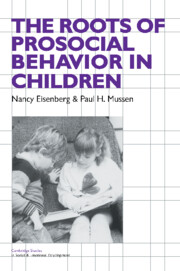Book contents
- Frontmatter
- Contents
- Preface
- 1 Introduction
- 2 Methodological and theoretical considerations in the study of prosocial behavior
- 3 Biology and prosocial behavior
- 4 Culture and prosocial behavior
- 5 “Person” variables and prosocial behavior
- 6 Socialization in the family
- 7 Socialization by agents outside the family
- 8 Cognition, role taking, interpersonal problem solving, and moral judgment
- 9 Emotional factors in prosocial behavior
- 10 Situational determinants
- 11 Conclusions
- References
- Name index
- Subject index
7 - Socialization by agents outside the family
Published online by Cambridge University Press: 31 December 2009
- Frontmatter
- Contents
- Preface
- 1 Introduction
- 2 Methodological and theoretical considerations in the study of prosocial behavior
- 3 Biology and prosocial behavior
- 4 Culture and prosocial behavior
- 5 “Person” variables and prosocial behavior
- 6 Socialization in the family
- 7 Socialization by agents outside the family
- 8 Cognition, role taking, interpersonal problem solving, and moral judgment
- 9 Emotional factors in prosocial behavior
- 10 Situational determinants
- 11 Conclusions
- References
- Name index
- Subject index
Summary
Although caregivers and the immediate family generally are the primary agents of socialization in the child's earliest years, other agents become increasingly important as children grow older. Among these are peers, schools, and media that socialize, as caregivers do, by direct instruction, modeling, administering rewards and punishments, and providing contacts and experiences from which children acquire knowledge of the social world, its norms and expectations. Yet, until recently, there had been surprisingly little systematic investigation of the actual influences of these socializing agents on prosocial behavior. As we shall see, relevant studies of the impact of television far outnumber investigations of the influences of peers and schools programs.
Peer influences
Common sense, folk wisdom, and casual observation all attest to the truth of the statement that “peer interaction is a socializing context” (Hartup, 1983, p. 164). Parents try to discourage their children from associating with certain peers because they are afraid that their children may acquire those peers' undesirable characteristics. On the other hand, friendships with children with desirable characteristics are encouraged in the hope that their own children will emulate these characteristics. These hopes and fears may be well founded, for abundant research evidence demonstrates that peers can play critical roles in shaping children's behavior patterns in either positive or negative ways.
- Type
- Chapter
- Information
- The Roots of Prosocial Behavior in Children , pp. 95 - 107Publisher: Cambridge University PressPrint publication year: 1989



